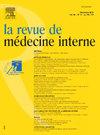[系统性自身炎症性疾病的基因嵌合:文献综述]。
IF 0.7
4区 医学
Q3 MEDICINE, GENERAL & INTERNAL
引用次数: 0
摘要
全身性自身炎症性疾病(SAIDs)是一种与先天性免疫失调有关的疾病,患者通常会出现全身性炎症表现,尤其是发热、皮肤黏膜皮疹、关节肌痛和腹痛,同时血液中的炎症生物标志物也会增加。在发现这些疾病时,它们与编码先天性免疫相关蛋白的基因发生突变有关,当时人们认为这些疾病必须始于儿童时期。自 2005 年以来,文献中已经报道了几例嵌合体病例,最初是在冰冻蛋白病中,但在其他 SAIDs 中也有明显的临床表型和发病较晚的患者,特别是在 VEXAS 综合征(空泡、E1 酶、X-连锁、自体炎、体细胞综合征)中,最近在 MEVF 基因中也有报道。下一代测序技术在检测马赛克基因方面比桑格测序技术更敏感。因此,当临床诊断似乎显而易见,但通过低深度基因分析却未发现基因突变时,与遗传学专家讨论是否考虑对儿童或成人采用另一种遗传学方法是非常有用的。这就改变了临床医生可以诱发这些疾病的情况。本综述提供了有关 SAIDs 马赛克现象的最新进展。本文章由计算机程序翻译,如有差异,请以英文原文为准。
Mosaïcisme génétique dans les maladies auto-inflammatoires : revue de la littérature
Systemic auto-inflammatory diseases (SAIDs) are disorders associated with deregulation of innate immunity in which patients present classically with systemic inflammatory manifestations, in particular fever, skin-mucosal rashes, arthromyalgia and abdominal pain, with an increase in blood biomarkers of inflammation. At the time of their discovery, these diseases were associated with constitutional mutations in genes encoding proteins involved in innate immunity, and it was then considered that they had to begin in childhood. This dogma of constitutional mutations in SAIDs is no longer so unquestionable, since 2005 several cases of mosaicism have been reported in the literature, initially in cryopyrinopathies, but also in other SAIDs in patients with obvious clinical phenotypes and late onset of disease expression, in particular in the VEXAS syndrome (Vacuoles, E1 enzyme, X-linked, Autoinflammatory, Somatic Syndrome) and very recently in MEVF gene. Next-generation sequencing techniques are more sensitive than Sanger for detecting mosaicisms. So, when a clinical diagnosis seems obvious but no constitutional mutation is found by low-depth genetic analysis, it is useful to discuss with expert geneticists whether to consider another genetic approach in a child or an adult. This modifies the situations in which clinicians can evoke these diseases. This review provides an update on mosaicism in SAIDs.
求助全文
通过发布文献求助,成功后即可免费获取论文全文。
去求助
来源期刊

Revue De Medecine Interne
医学-医学:内科
CiteScore
0.70
自引率
11.10%
发文量
526
审稿时长
37 days
期刊介绍:
Official journal of the SNFMI, La revue de medecine interne is indexed in the most prestigious databases. It is the most efficient French language journal available for internal medicine specialists who want to expand their knowledge and skills beyond their own discipline. It is also the main French language international medium for French research works. The journal publishes each month editorials, original articles, review articles, short communications, etc. These articles address the fundamental and innumerable facets of internal medicine, spanning all medical specialties. Manuscripts may be submitted in French or in English.
La revue de medecine interne also includes additional issues publishing the proceedings of the two annual French meetings of internal medicine (June and December), as well as thematic issues.
 求助内容:
求助内容: 应助结果提醒方式:
应助结果提醒方式:


